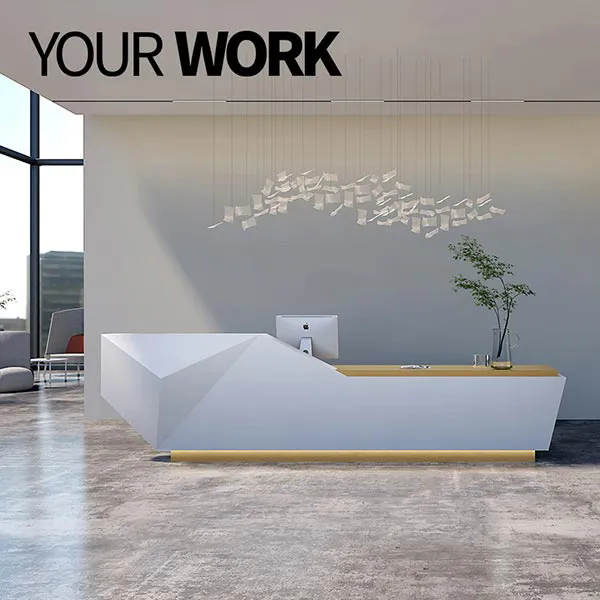The Ultimate Guide to Reception Desk Furniture: Making a Lasting First Impression
2024-09-12
The reception desk is the gateway to any business or organization, serving as the first point of contact for clients, visitors, and employees. It’s not just a piece of furniture but a crucial element that reflects your brand’s identity and sets the tone for your business interactions. In this blog, we’ll explore the importance of reception desk furniture, key features to consider, and tips for selecting the perfect desk to enhance your office environment.
Why Reception Desk Furniture Matters
1. First Impressions Count: The reception area is where guests form their initial impressions of your business. A well-designed reception desk can convey professionalism, hospitality, and attention to detail. It sets the stage for the rest of the visitor’s experience.
2. Functionality and Efficiency: Beyond aesthetics, a reception desk must be functional. It should provide adequate space for receptionists to work efficiently while accommodating essential equipment like phones, computers, and filing systems.
3. Brand Identity: The reception desk is an opportunity to reinforce your brand’s identity. Custom designs, colors, and materials can be used to reflect your company’s values, culture, and style.
4. Visitor Experience: A well-designed reception area can make visitors feel welcomed and valued. Comfortable seating, clear signage, and a tidy environment contribute to a positive visitor experience.
Key Features to Consider
1. Design and Aesthetics: The design of your reception desk should align with your overall office décor and branding. Whether you prefer a sleek modern look, a classic wooden finish, or a contemporary style, the desk should complement the space and create a cohesive appearance.
2. Size and Layout: Consider the size of your reception area when selecting a desk. The desk should fit comfortably within the space without overwhelming it. It’s important to choose a layout that allows for easy movement and accessibility for both staff and visitors.
3. Materials and Finishes: The choice of materials and finishes impacts both the look and durability of the reception desk. Common materials include wood, metal, glass, and laminate. Each has its own aesthetic and practical benefits. For example, wooden desks provide a classic and warm feel, while glass and metal offer a modern and sleek appearance.
4. Ergonomics and Comfort: Receptionists spend a significant amount of time at their desks, so comfort is crucial. Look for desks with ergonomic features such as adjustable heights, ample legroom, and user-friendly layouts. Ergonomic design helps reduce strain and promotes productivity.
5. Storage Solutions: A reception desk should offer adequate storage for essential items such as office supplies, paperwork, and personal belongings. Consider desks with built-in drawers, cabinets, and shelving to keep the workspace organized and clutter-free.
6. Accessibility and Flexibility: Ensure that the desk design allows for easy access to all necessary equipment and resources. Modular or adjustable desks can provide flexibility to adapt to changing needs or future office layouts.
7. Technology Integration: Modern reception desks often incorporate technology features such as built-in charging stations, cable management systems, and connectivity options. These features help keep the workspace organized and support efficient operations.
Tips for Selecting the Perfect Reception Desk
1. Define Your Needs: Start by identifying the specific needs of your reception area. Consider the volume of traffic, the type of work being done, and the available space. This will help guide your choices in terms of size, layout, and features.
2. Set a Budget: Determine your budget for reception desk furniture. While it’s important to invest in quality and functionality, there are options available at various price points. Finding the right balance between cost and value is key.
3. Consult with Professionals: If you’re unsure about the best options for your space, consider consulting with an interior designer or office furniture specialist. They can provide valuable insights and help you choose a desk that meets your needs and enhances your office environment.
4. Test the Desk: If possible, visit showrooms or test out different desk models to assess their functionality and comfort. This hands-on approach ensures that the desk you choose will meet your expectations and work well in your space.
5. Consider Future Needs: Think about the future needs of your office and choose a desk that can accommodate growth or changes. Modular or adjustable designs can offer long-term flexibility and adaptability.
Conclusion
Reception desk furniture is more than just a functional piece of office equipment; it’s a critical component of your business’s first impression and overall ambiance. By focusing on design, functionality, and comfort, you can select a reception desk that enhances your office environment, reflects your brand’s identity, and supports efficient operations. Invest in quality reception desk furniture to create a welcoming and professional atmosphere that leaves a lasting impression on your clients and visitors.



